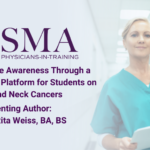Abstract | May 6, 2021
Raising Vaccine Awareness Through a Novel Education Platform for Students on Head and Neck Cancers
Learning Objectives
- Consider the value of teaching medical students as a way to pass knowledge into underserved populations.
- Understand the varied utility of vaccine adherence - from cancer prevention to prevention of viral illnesses, such as COVID-19.
- Gain a general understanding of the program used to educate Tulane University medical students on head and neck cancers, and replicate the program as desired at your home institution.
Introduction:
Early treatment of head and neck cancers is known to significantly improve patient outcomes. In fact, if the cancer is localized, the 5-year survival is 86%, but it is only 36% with distant metastases. Notably, early detection of head and neck cancer is difficult among underserved patients, who do not have routine medical visits. Medical students have the unique opportunity to interact with patients through student-run clinics and are often the only medical personnel to spend significant time with these high-risk individuals. However, many students do not have a sufficient knowledge of head and neck cancer prevention and screening. For example, only half of graduating medical students are aware that the human papillomavirus (HPV) vaccine can protect against the development of these cancers.
While the inadequacy of medical student head and neck cancer education has been well-demonstrated, little has been done to improve this problem. Comparatively, a community-based educational platform has previously been successful in teaching patients about the link between the HPV vaccine and prevention of a variety of cancers. We expect that using a similar educational platform for medical students may better prepare students to teach patients about this link, thus improving HPV vaccination participation.
Goals:
Through this project, we aim to educate medical students on head and neck cancer for the purpose of improving patient care. Although our focus is on head and neck cancers and HPV vaccination, we see this as an opportunity to increase understanding of vaccines as an important part of preventative health practices. We are studying the efficacy of our educational platform, which is administered in an animated video format, through a pre-video and post-video survey of knowledge, attitudes, and practices. In the future, medical students will show this video to their patients. This will allow for the greatest spread of knowledge into the community. Our ultimate goal is to determine methods to increase vaccination rates in underserved communities. We hope our platform proves to be effective and transitive to increasing understanding of the new COVID-19 vaccine, since vaccination is the most promising key to slowing its spread.

